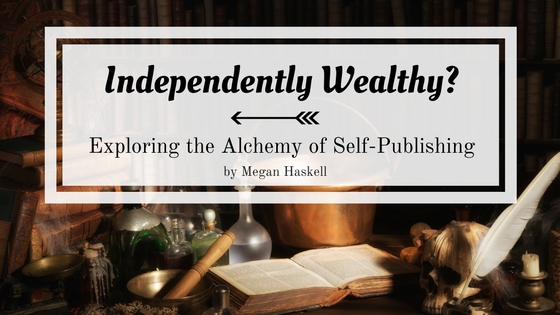by Megan Haskell
Before I hit publish on my first novel, I was terrified of making a mistake, anxious to put my best foot forward, and petrified that no one would like or be interested in my story. How could I possibly know if my writing was something someone somewhere would want to read? How could I be sure that I was creating a professional product, indistinguishable from my traditionally published counterparts?
The only way was to endure the harshest of critics, both before and after publication. I had to overcome my fear of criticism and put my work out there. Let’s be real, I still have to overcome that fear every single time I publish a book or request a review. So let’s walk through the steps.
1. Self-Assessment
Everyone has heard the mantra: “write a sh*…ahem, crummy…first draft”. It’s great advice. Don’t let your self-editor get in the way, just get the words on the page.
Unfortunately when that draft is done, you have to face those words head on. Be your own worst critic. But how do you do that?
First, set the book aside for as long as you can. I shut down Scrivener and don’t reopen the project for at least a week or two. (I use the “empty” time to catch up on other things, like planning the production schedule and book launch.)
The time away is critical to distance myself from the book. I have to be able to see the manuscript for what it is not what I want it to be. When I re-read the manuscript I can pretend I’m the audience, not the author.
I like to read the entire manuscript, cover-to-cover, before digging into the serious editing, just to get a sense of the success or failure of the overall story. I ask myself:
- Am I having fun reading this story?
- Am I fully engaged? Absorbed in the characters? Immersed in the world? Hooked?
- Does the story make sense? Have I left out any major plot points?
- Does the pace fit with the genre? Does it ebb and flow, while building to the climax?
- Does the dialogue feel real?
After that I work chapter by chapter to polish and perfect the work before sending it off to stage two, the critique partner or peer review.
I should mention at this point, that I always hesitate before hitting “send.” Fear and self-doubt roar their way to the surface of my thoughts. But I beat them back with the knowledge that I’ve done everything in my power — everything I can do by myself, that is — to achieve my best possible story. The next step is to seek outside help.
2. Peer Critique
Peer critique is an essential step in the editing process. I don’t care what you’re working on…whether it’s a novel, a blog post, or even a spreadsheet. If it’s important to get it right, get at least one more set of eyes on it. They will see things you won’t. Period. They will ask questions that you haven’t thought of. You will learn and become better by listening to what they have to say.
There are several different kinds of peer critique you could utilize at this stage.
- Critique Partner: a single person, usually another writer within your genre, who will read your chapters and give you detailed feedback in exchange for the same on their work.
- Critique Group: a group of writers who provide feedback on each other’s work. Some groups meet in person, but there are also online critique groups. Some have accountability measures (e.g. everyone must provide a chapter for critique each week), others are ad hoc submissions when the chapter is ready. The benefit of these groups is that you have more eyes, and more opinions, on the work. The drawback is that the readers may not always read every chapter, or they may not read the chapters sequentially.
- Beta Readers: Sometimes writers, sometimes not, beta readers are individuals who want to help polish the novel. Different readers will have different strengths, so it’s important to select a team of readers who complement each other. Mix it up with a diverse group of men and women, writers and non-writers, hard core fans and casual acquaintances. DO NOT use family and close friends, unless you’re absolutely confident they will provide unbiased constructive criticism.
- Paid Editors: Developmental editors provide detailed feedback on the overall story components (structure, character, setting, etc). Copy editors give feedback on the line-by-line language (diction, dialogue, character, consistency, etc.). Proofreaders correct the inevitable typos and grammar errors.
When you receive the peer critique, listen, but do not respond. Resist the temptation to spout excuses or explanations. Set the criticism aside for a few days. Come back to it again after you’ve had enough time to look at everything objectively.
We’re writers. Our work is personal, even if it’s not memoir. At this point the people who’ve read it are trying to help you, not tear you down. Accept the criticism for what it is, a way to improve the story in particular, and your writing in general.
Now edit. And again.
You may choose to go through several rounds of peer critique, creating multiple drafts in the process. I use a critique partner first, then a paid developmental editor, then beta readers, then a paid copy editor. It’s a lot of work, and none of it is easy. But once I’m done, I know I’ve produced the best work I’m capable of. And that’s what matters.
3. Reviews
Indie or traditional, reviews are critical to your success (or failure). I find myself obsessing over my Amazon page, looking for the latest reviews of my books, reading them with exhilaration and heartache.
So far I’ve been pretty lucky. Rather, I think my hard work has paid off in books that my target audience seems to enjoy. Overall, the feedback has been very positive. But I’ve also had my fair share of negative reviews.
My favorite one-star: “Yuck”
A single word that stings like I swallowed a bee.
The reality is, no one can write a book that everyone will love. Even the classics are loathed by many. You will face negative criticism. There’s no getting around it. But if you’ve put in the work, produced the best book you’re capable of, then you’ve done your job.
So get over the fear, set aside the self-doubt, and let people read your story. You might be pleasantly surprised at your own competence. And if not, go back and try again. The more you write, the more you learn, the better you become.
Next month I’ll go into more detail about finding reviewers and dealing with them in a professional manner. Stay tuned!
***

Megan Haskell, Author
Legend has it, I was born with a book in my hands. Thirty-ish years later, I’m a stay-at-home-mom who prefers a good story over doing the dishes. Only now, I’m building my own fantasy worlds! I’m the author of the Amazon best selling series,The Sanyare Chronicles, and Program Director of O.C. Writers. You can find me on my website at www.meganhaskell.com, Facebook, and Twitter.




One Reply to “Is It Good Enough? Overcoming the Fear of Criticism”